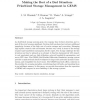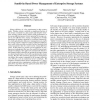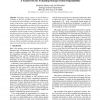SIGOPS
2008
14 years 22 days ago
2008
Self-managing storage systems have recently received attention from the research community due to their promised ability of continuously adapting to best reflect high-level system...
RSA
2006
14 years 22 days ago
2006
Motivated by a problem that arises in the study of mirrored storage systems, we describe, for any fixed , > 0 and any integer d 2, explicit or randomized constructions of d-r...
FGCS
2008
14 years 27 days ago
2008
As distributed storage systems grow, the response time between detection and repair of the error becomes significant. Systems built on shared servers have additional complexity be...
CORR
2010
Springer
14 years 28 days ago
2010
Springer
Distributed storage systems often introduce redundancy to increase reliability. When coding is used, the repair problem arises: if a node storing encoded information fails, in orde...
CIDR
2009
14 years 1 months ago
2009
Recent excitement in the database community surrounding new applications--analytic, scientific, graph, geospatial, etc.--has led to an explosion in research on database storage sy...
MASCOTS
2003
14 years 2 months ago
2003
— This paper introduces a new benchmark tool, SPEK (Storage Performance Evaluation Kernel module), for evaluating the performance of block-level storage systems in the presence o...
MASCOTS
2008
14 years 2 months ago
2008
Energy-efficiency is a key requirement in data centers today. Storage systems constitute a significant fraction of the energy consumed in a data center and therefore enterprise st...
MASCOTS
2008
14 years 2 months ago
2008
Obtaining representative and concise I/O workloads for the purpose of projecting the performance of storage systems remains a challenge due to the complex nature of I/O behaviors....
CODES
2008
IEEE
14 years 2 months ago
2008
IEEE
The capacity of flash-memory storage systems grows at a speed similar to many other storage systems. In order to properly manage the product cost, vendors face serious challenges ...
DSN
2004
IEEE
14 years 4 months ago
2004
IEEE
Designing storage systems to provide business continuity in the face of failures requires the use of various data protection techniques, such as backup, remote mirroring, point-in-...






